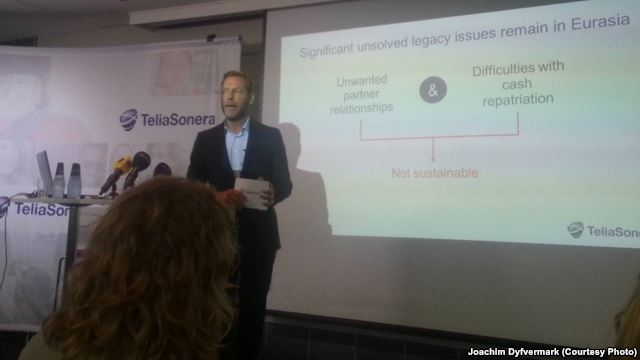TeliSonera to exit troubled markets in ex-Soviet Union
| Publisher | Radio Free Europe/Radio Liberty |
| Publication Date | 17 September 2015 |
| Cite as | Radio Free Europe/Radio Liberty, TeliSonera to exit troubled markets in ex-Soviet Union, 17 September 2015, available at: http://www.refworld.org/docid/561d047b11.html [accessed 25 December 2015] |
| Disclaimer | This is not a UNHCR publication. UNHCR is not responsible for, nor does it necessarily endorse, its content. Any views expressed are solely those of the author or publisher and do not necessarily reflect those of UNHCR, the United Nations or its Member States. |
September 17, 2015
By RFE/RL's Uzbek Service
 TeliaSonera CEO Johan Dennelind announced his company's withdrawal from Eurasia on September 17.
TeliaSonera CEO Johan Dennelind announced his company's withdrawal from Eurasia on September 17.
TeliaSonera says it plans to exit six markets in the former Soviet Union in which the Scandinavian telecoms giant has been hit hard by bribery investigations, troubles repatriating cash, and difficulties identifying who, exactly, its local partners are.
The company announced the withdrawals in a September 17 press statement that said "a process has been initiated in order to reduce the presence in Region Eurasia and over time fully leave."
Russian Eurasia was a corporate area of operations that included Kazakhstan, Uzbekistan, Azerbaijan, Georgia, Moldova, and Tajikistan, as well as Nepal. TeliaSonera will maintain its presence in Russia and the Baltic states.
Altogether, the markets TeliaSonera is vacating accounted for a fifth of the company's sales in 2014, and nearly a third of its earnings.
"We need to refocus the company into the regions Europe and Sweden," CEO Johan Dennelind explained to RFE/RL's Uzbek Service. "It requires a lot of attention and investment to be successful and create value in Sweden and in Europe."
"Unresolved issues in the Region Eurasia are also contributing to this decision," he added.
Dennelind outlined some of those issues in a telephone news conference on September 17.
He said that TeliaSonera still does not know the identity of the ultimate owners of its local partner companies in Uzbekistan and Azerbaijan, and is sitting on some $605 million that it cannot repatriate from Uzbekistan and Nepal.
On top of that, Dennelind said TeliaSonera is facing "an ongoing preliminary investigation from several prosecutors in Uzbekistan."
Upon his appointment two years ago, Dennelind was tasked with restoring TeliaSonera's reputation after corruption allegations stemming from a deal to get a mobile license in Uzbekistan forced his predecessor, Lars Nyberg, Chief Financial Officer Per-Arne Blomquist, and three other senior executives to step down.
A law firm hired to look into the corruption accusations concluded that TeliaSonera should have been more careful when it bought the Uzbek license in 2007.
In its statement, TeliaSonera said the current process to reduce its presence in Region Eurasia has already begun, and that there is no telling how long the divestment will take.
In the meantime, it added, the company will "continue to operate and develop the Eurasian operations in a sustainable and responsible way."
With reporting by bloomberg.com and Reuters
Link to original story on RFE/RL website
